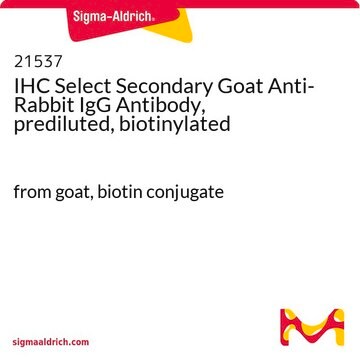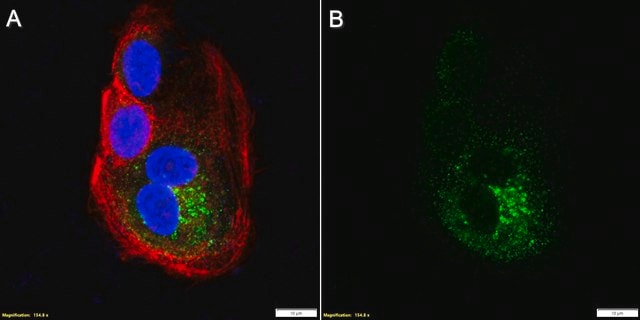MABF2107
Anti-Chlamydial LPS Antibody, clone EVI-H1
clone EVI-H1, from mouse
Sinónimos:
Chlamydial lipopolysaccharide, Chlamydia trachomatis LPS
About This Item
Productos recomendados
biological source
mouse
antibody form
purified antibody
antibody product type
primary antibodies
clone
EVI-H1, monoclonal
species reactivity
bacteria
packaging
antibody small pack of 25 μg
technique(s)
electron microscopy: suitable
immunocytochemistry: suitable
immunofluorescence: suitable
western blot: suitable
isotype
IgG2a
target post-translational modification
unmodified
General description
Specificity
Immunogen
Application
Immunocytochemistry Analysis: A representative lot detected Chlamydial LPS in Immunocytochemistry applications (Wolf, K., et. al. (2001). Infect Immun. 69(5):3082-91).
Electron Microscopy Analysis: A representative lot detected Chlamydial LPS with Trasnsmission Electron Microscopy applications (Wolf, K., et. al. (2001). Infect Immun. 69(5):3082-91).
Inflammation & Immunology
Quality
Western Blotting Analysis: 2 µg/mL of this antibody detected Chlamydial LPS in HeLa cells infected with chlamydia trachomatis serovar L2 (LGV 434 L2).
Target description
Physical form
Storage and Stability
Other Notes
Disclaimer
¿No encuentra el producto adecuado?
Pruebe nuestro Herramienta de selección de productos.
Certificados de análisis (COA)
Busque Certificados de análisis (COA) introduciendo el número de lote del producto. Los números de lote se encuentran en la etiqueta del producto después de las palabras «Lot» o «Batch»
¿Ya tiene este producto?
Encuentre la documentación para los productos que ha comprado recientemente en la Biblioteca de documentos.
Nuestro equipo de científicos tiene experiencia en todas las áreas de investigación: Ciencias de la vida, Ciencia de los materiales, Síntesis química, Cromatografía, Analítica y muchas otras.
Póngase en contacto con el Servicio técnico








